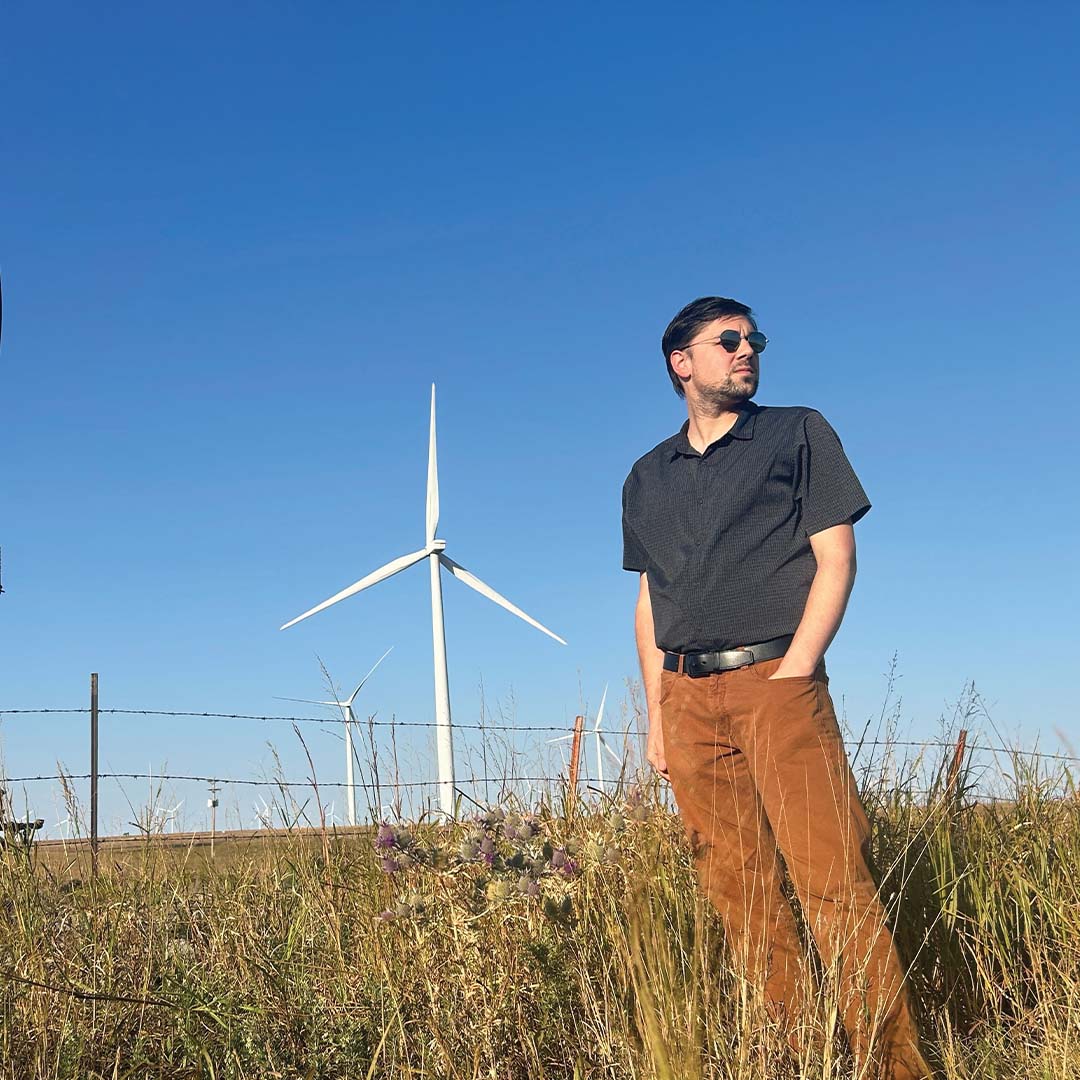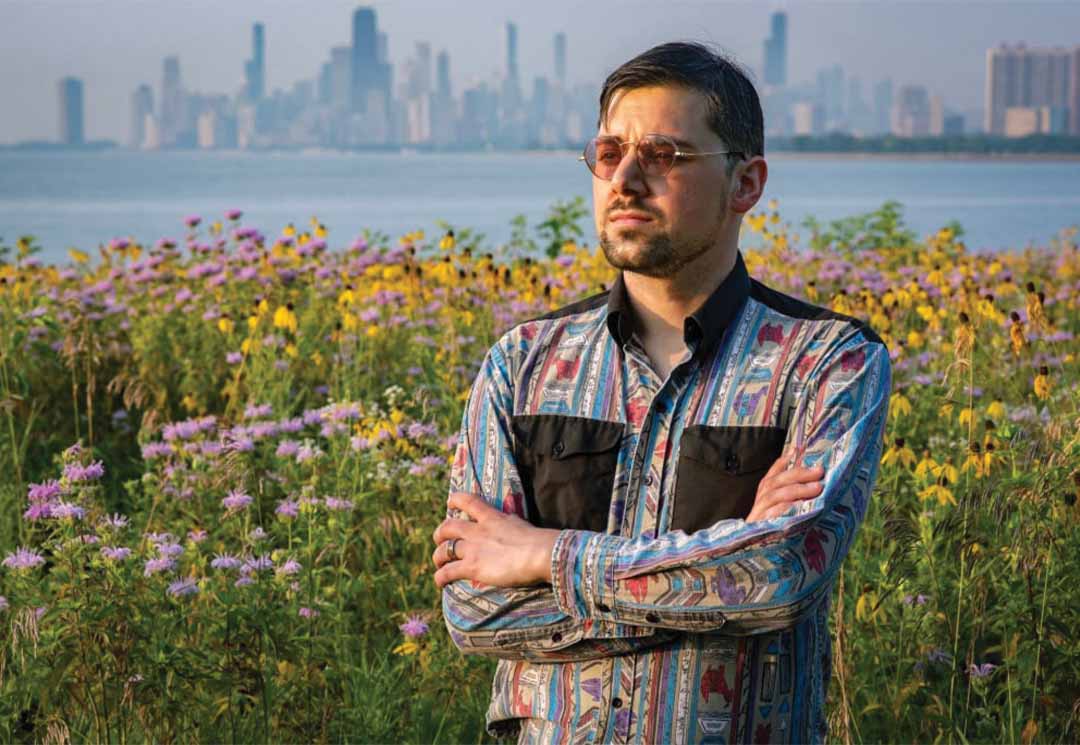A Journey to Sustainability Leadership

From Osage roots to renewable energy, alumnus Saxon Metzger leads the charge in sustainable innovation.
As a full-fledged member of the Osage Nation, Saxon Metzger entered the world with an innate appreciation of the environment. But it was the public schools of Carlsbad, a California coastal city, that taught him the fragile nature of the world around him.
“The Pacific Ocean was something you grew up orienting yourself towards,” Metzger says, “and I credit those schools with making it a childhood lesson that you should take care of your planet. They taught you about things like sea turtles and plastic straws and made it more understandable that everyone’s actions had a direct effect on the ocean and the environment.”
The seed planted by that early education sprouted into a career that has made the 29-year-old Metzger, through his company, Eighth Generation Consulting, a renowned player in sustainability and renewable energy. He recently enhanced his credentials by earning an MBA, with a concentration in Sustainability, from Wilmington University, which led to his becoming a guest lecturer for the University’s MBA program.
Metzger lives in Chicago and teaches remotely, specializing in Sustainable Business and Economics courses, including Quantitative Analytics, Economics, Global Marketing Management, and Sustainable Business.
“Saxon earned his MBA two years ago and was eager to give back by sharing his knowledge as an adjunct faculty member,” says Dr. Shawn McCloud, chair of the MBA Program. “As a WilmU alum with a diverse range of professional experiences, he is a great match for WilmU’s mission and an invaluable asset to our students. His real-world experience, especially in areas like sustainability and cross-sector collaboration, helps students learn and apply concepts to their future careers.”
Metzger received a degree in Economics from the University of Utah in 2021, the same year he started Eighth Generation as a part-time endeavor. He wanted to supplement his professional credentials with an MBA, and he had some knowledge of WilmU because his fiancée had earned a WilmU MBA the previous summer. After doing a bit more research, he enrolled.
“It was a program that I could pursue while writing a sustainability plan for the city of Carbondale as well as working as a director of Solarize Southern Illinois, both requiring me to be physically in the area,” he says.
According to Dr. McCloud, teaching via Zoom has not hampered Metzger’s effectiveness. “Students have expressed how much they appreciate Saxon’s responsiveness and flexibility,” he says. “They consistently rave about his availability, clarity, and real-life applications of coursework. He ensures that they understand expectations and feel supported throughout the course.”

Metzger went full-time into Eighth Generation in January of last year. Since then, the company has flourished with a staff of just three, along with several interns. “We’ve managed sustainability plans, land acquisition projects, grants, climate baseline reporting, educational seminars, and more,” says Metzger. “I focus on the decommissioning of solar, storage, and wind systems.”
Much of Eighth Generation’s work has been centered in Osage County, Oklahoma, where, Metzger says, there are more orphaned oil wells than anywhere else in the world — more than 19,000, according to some estimates.
He points out that the wind turbine, representative of the transition into clean energy, also comes with challenges. “When wind gets decommissioned,” he says, “some folks have thrown turbines into landfills, and our company focuses on not just workforce development and edu-cation to help train folks to solve these problems, it engages in construction and demos to actually work on decommissioning safely and sustainably by diverting solar panels and other material to optimum use, even allowing for re-use and remanufacturing.”
Eighth Generation has been recognized by MIT Solve and won the 2024 Department of Energy Community Energy Innovation Prize. While Metzger is Osage, the company’s name is derived from the Iroquois philosophy that decisions made today should result in a sustainable world seven generations into the future. “Eighth Generation” extends that philosophy.
He hopes to relocate the company soon to Pawhuska, Oklahoma, Osage Nation’s cultural and governmental center, where his family’s ties run deep. As documented by the book and film adaptation “Killers of the Flower Moon,” the discovery of oil in the early 1900s on Osage land led to the murder of more than 100 Osage.
“My great-grandmother fled the Nation when the violence claimed members of their family,” says Metzger, “and my work with my brother, a PhD candidate at NYU who’s our director of Grants and Research, is the first time that our family has had a business in Pawhuska. We are in the process of moving back.
“Our journey has been humbling, filled with overwhelming support and opportunities, and we’ve learned that great ideas need collaboration, support, and refinement.”
— Bob Yearick
Want to read more in-depth stories? Explore our latest magazine articles.



